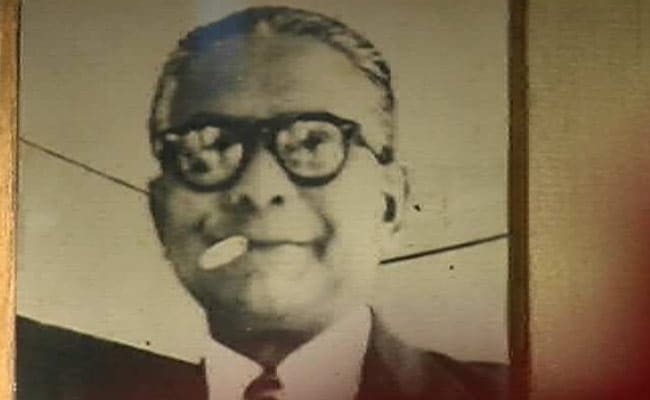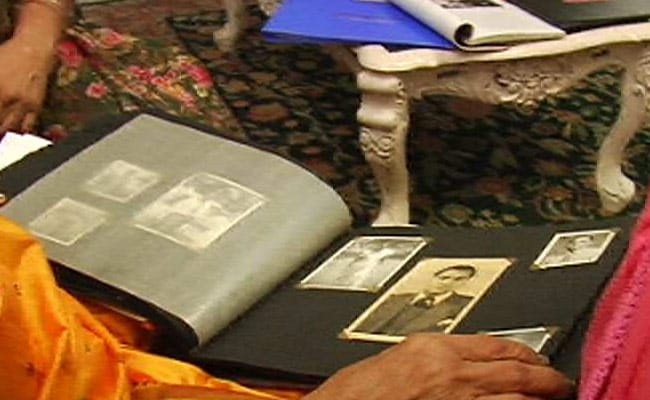
Sheila Darbari is the daughter of JC Nigam, who was the district magistrate of Ballia in 1942.
New Delhi:
Three years ago Janice Darbari got a call from Ballia in Uttar Pradesh, asking for her mother. "We have just learnt that Sheilaji is in good health and we would like to invite her to our August Kranti Diwas," the caller said. For Janice and her sister Rajalakshmi, this was the beginning of piecing together a forgotten part of their family history -- the starting point, their mother.
At 90, Sheila Darbari's memory for detail is phenomenal. She was 15 when on August 8, 1942, Mahatma Gandhi gave his Quit India call. "It was a time of revolution. Women would gather in neighbourhoods and sing Bhagat Singh songs... they would talk about joining Gandhi and Congress leaders would go door to door mobilizing people in Ballia," she said.
Sheila Darbari's father, JC Nigam, was an ICS officer, posted as the district magistrate of Ballia. She recalls how after the Quit India call, schools were closed down, prominent local Congress leaders started organizing rallies, demanded that courts be shut, freedom fighters released from jail. Initially, there were serious attempts to stop this by armed policemen who lathi-charged the crowds.
 "There were sporadic incidents of violence in the next few days and many people died. But I remember my father telling the family that the tide was turning that the administration could no longer control this movement," recalled Mrs Darbari.
"There were sporadic incidents of violence in the next few days and many people died. But I remember my father telling the family that the tide was turning that the administration could no longer control this movement," recalled Mrs Darbari.
On August 19, thousands of people from villages across Ballia started marching towards the district magistrate's compound. JC Nigam knew the situation was uncontrollable, any attempts to stop it would result in a bloodbath.
"My father had orders to maintain peace and prevent crowds from gathering. He had orders to shoot if need be, but he had already taken all the arms, pistols and guns from the police. He said, 'Why should I shoot? I must listen to what they want, that's my duty. If they want azadi, they should have it. I too want azadi'."
In her retelling of the events, Mrs Darbari also remember her father going to Ballia jail on August 18 to negotiate the release of prominent Congress leaders like Chitu Pandey on the condition that the protests would be peaceful.
On the morning of August 19, when a crowd of more than 5000 people reached the district magistrate's compound they were greeted by their leader Chitu Pandey and JC Nigam. Amid slogans and songs of freedom, the Union Jack was lowered and the Tricolour unfurled.
Ballia became the first Indian city to declare its independence from British rule, at least for a few days, she said. A popular government was formed, led by Chitu Pandey. It took less than 10 days for the British to unleash the most brutal reprisal. The colonial government killed more than a 100 leaders by hanging them from trees. Others were shot or tortured or simply imprisoned in overcrowded jails. "The reign of terror lasted for years, but no one could suppress the revolutionary spirit of Ballia," said Darbari with undiminished pride.
 Her father was dismissed from his job -- the British officials sent to investigate his role held him responsible for allowing crowds to gather. In old documents that Sheila's daughter's Janice and Rajalakshmi found in the British archives, the charges against Nigam include a mention that his son participated in the freedom rallies.
Her father was dismissed from his job -- the British officials sent to investigate his role held him responsible for allowing crowds to gather. In old documents that Sheila's daughter's Janice and Rajalakshmi found in the British archives, the charges against Nigam include a mention that his son participated in the freedom rallies.
For his family, JC Nigam is a freedom fighter, acting out of a spirit of patriotism, but other accounts are not so categorical. He features in Shyam Benegal's "Bharat ek Khoj" where the late Om Puri was cast as Nigam in the episode on Quit India movement. Nigam's heroism is shown to be tempered by practical considerations, when he says in the absence of reinforcements, the administration had no other choice.
Nigam's granddaughters argue that they never pushed for their grandfather to be seen as a hero, it was the people of Ballia who made them aware of how significant his role was. "Every year on August 19, the people of Ballia celebrate August Kranti Diwas which marks their independence from the British. It is they who remember how our grandfather made it possible," Rajalakshmi said. "We knew Nana was a patriot, but it was only later we realised how he was perceived in Ballia".
"You know I live right next to August Kranti Marg in Delhi," their mother added, "For me, it is a road that's named after Ballia's revolution".
At 90, Sheila Darbari's memory for detail is phenomenal. She was 15 when on August 8, 1942, Mahatma Gandhi gave his Quit India call. "It was a time of revolution. Women would gather in neighbourhoods and sing Bhagat Singh songs... they would talk about joining Gandhi and Congress leaders would go door to door mobilizing people in Ballia," she said.
Sheila Darbari's father, JC Nigam, was an ICS officer, posted as the district magistrate of Ballia. She recalls how after the Quit India call, schools were closed down, prominent local Congress leaders started organizing rallies, demanded that courts be shut, freedom fighters released from jail. Initially, there were serious attempts to stop this by armed policemen who lathi-charged the crowds.

JC Nigam was sacked -- the British officials held him responsible for allowing the protest.
On August 19, thousands of people from villages across Ballia started marching towards the district magistrate's compound. JC Nigam knew the situation was uncontrollable, any attempts to stop it would result in a bloodbath.
"My father had orders to maintain peace and prevent crowds from gathering. He had orders to shoot if need be, but he had already taken all the arms, pistols and guns from the police. He said, 'Why should I shoot? I must listen to what they want, that's my duty. If they want azadi, they should have it. I too want azadi'."
In her retelling of the events, Mrs Darbari also remember her father going to Ballia jail on August 18 to negotiate the release of prominent Congress leaders like Chitu Pandey on the condition that the protests would be peaceful.
On the morning of August 19, when a crowd of more than 5000 people reached the district magistrate's compound they were greeted by their leader Chitu Pandey and JC Nigam. Amid slogans and songs of freedom, the Union Jack was lowered and the Tricolour unfurled.
Ballia became the first Indian city to declare its independence from British rule, at least for a few days, she said. A popular government was formed, led by Chitu Pandey. It took less than 10 days for the British to unleash the most brutal reprisal. The colonial government killed more than a 100 leaders by hanging them from trees. Others were shot or tortured or simply imprisoned in overcrowded jails. "The reign of terror lasted for years, but no one could suppress the revolutionary spirit of Ballia," said Darbari with undiminished pride.

The British hanged more than a 100 leaders of Ballia August Kranti, many others were tortured.
For his family, JC Nigam is a freedom fighter, acting out of a spirit of patriotism, but other accounts are not so categorical. He features in Shyam Benegal's "Bharat ek Khoj" where the late Om Puri was cast as Nigam in the episode on Quit India movement. Nigam's heroism is shown to be tempered by practical considerations, when he says in the absence of reinforcements, the administration had no other choice.
Nigam's granddaughters argue that they never pushed for their grandfather to be seen as a hero, it was the people of Ballia who made them aware of how significant his role was. "Every year on August 19, the people of Ballia celebrate August Kranti Diwas which marks their independence from the British. It is they who remember how our grandfather made it possible," Rajalakshmi said. "We knew Nana was a patriot, but it was only later we realised how he was perceived in Ballia".
"You know I live right next to August Kranti Marg in Delhi," their mother added, "For me, it is a road that's named after Ballia's revolution".
Track Latest News Live on NDTV.com and get news updates from India and around the world

